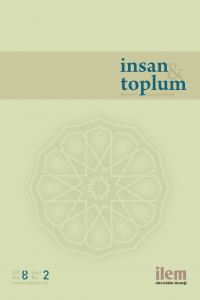“‘Mahalle’ Dışında, Klavye Başında”: İmam Hatip Lisesi Öğrencilerinin Sosyal Hayatları ve Sosyal Medya Kullanımları
Abstract
Bu çalışmada, 2011-2016 yılları arasında İmam Hatip Lisesi (İHL) öğrencilerinin sosyal hayat ve sosyal medya tecrübelerindeki değişim ele alınmıştır. Nitel araştırma yöntemlerinden etnografyanın kullanıldığı boylamsal bir araştırmaya dayanan çalışmanın ilk etabı, 2011 yılında İstanbul’un önde gelen üç İHL’sinden 30 öğrenci ile mülakatlar yapılarak gerçekleştirilmiştir. 2016 yılındaki ikinci etabında aynı okullardan farklı öğrencilerle yenilenen araştırma, toplamda 60 katılımcının paylaşımlarının analiz ve değerlendirmesini içermektedir. Çalışmada, katılımcıların İHL’de öğrenim görmelerinin sosyal hayatlarına olan etkisinin yanında, sosyal medyayı nasıl kullandıkları ve “imam hatiplilik” bilincinin sosyal medyadaki tezahürü incelenmiştir. Son beş yıllık süreçte İHL; öğretim kademesi, okul sayısı, öğrenci demografisi, karma eğitim uygulaması ve üniversiteye girişte katsayı uygulaması gibi konularda değişimler yaşamıştır. Bu değişimlerin yaşandığı süre içinde iki ayrı etap olarak gerçekleştirilen araştırmada İHL öğrencilerinin sosyal hayatları bağlamında ön plana çıkan, özellikle ahlakî olarak kendilerini diğer okullarda öğrenim gören yaşıtlarından farklı görme eğilimi olmuştur. Katılımcıların sosyal medya deneyimlerinde gizli kimliklerle kendini daha rahat ifade etme tutumu baskın olmakla birlikte, imam hatiplilik bilincinin de sosyal medyadaki paylaşım ve davranışlarında etkili olduğu görülmüştür. Bunlara ilaveten araştırmanın ilk etabında karşılaşılan öğrencilerin daha idealist, ikinci etapta görüşülen öğrencilerin ise görece daha özgüvenli olmaları, iki dönem arasındaki farklar bağlamında kaydedilmeye değerdir.
Keywords
References
- Akpınar, A. (2011). Devlet Eğitimi Yoluyla İyi Bir Yurttaş ve Bilinçli Bir Müslüman Yaratmak: İmam-Hatip Liseleri Örneği. Carlson, M, Rabo, A. & Gök, F. (Der.), Çokkültürlü Toplumlarda Eğitim: Türkiye ve İsveç’ten Örnekler içinde (s. 181-202). İstanbul: Bilgi Üniversitesi.
- Aşlamacı, İ. (2017). Öğrenci ve Öğretmenlerine Göre İmam-Hatip Liseleri: Profiller, Algılar, Memnuniyet, Aidiyet (Araştırma Raporu). İstanbul: DEM.
- Ayhan, H. (2014). Türkiye’de Din Eğitimi (3. baskı). İstanbul: DEM.
- Bozan, İ. (2007). Devlet ile Toplum Arasında Bir Okul: İmam Hatip Liseleri, Bir Kurum: Diyanet İşleri Başkanlığı. İstanbul: TESEV.
“Mahalle’ Dışında, Klavye Başında”: İmam Hatip Lisesi Öğrencilerinin Sosyal Hayatları ve Sosyal Medya Kullanımları
Abstract
This study is about the change of social life and social media experiences of a sample chosen from the Imam and Preacher School (IPS) between 2011-2016. The method of this study is ethnographic based upon a longitudinal research; in the first stage there has been 30 interviews with the students of prominent three IPS in Istanbul, in 2011. In the second stage, in 2016, the research has been renewed with the different students and is composed of 60 interviews. The research looks at the social impact of being an IPS student, besides how these students use the social media and manifestation of this social belonging in the social media. In the previous five years, there have been some changes in education level, numbers of IPS, demography of students, coeducation and the coefficients for the university applying. In this process of change, what come forward in terms of the social life of IPS students, is a tendency among them in defining
themselves different than their peers in other schools, especially in moral terms. It is an outstanding result
that the participants can express themselves better under their social media avatars. But also, the research
shows up that, their conscious of belonging can be detected in the social media shares and demeanors. It is
noteworthy in the context of comparison between the two groups; the 2011 group was statistically more
idealist whereas the 2016 group was more self-confident.
References
- Akpınar, A. (2011). Devlet Eğitimi Yoluyla İyi Bir Yurttaş ve Bilinçli Bir Müslüman Yaratmak: İmam-Hatip Liseleri Örneği. Carlson, M, Rabo, A. & Gök, F. (Der.), Çokkültürlü Toplumlarda Eğitim: Türkiye ve İsveç’ten Örnekler içinde (s. 181-202). İstanbul: Bilgi Üniversitesi.
- Aşlamacı, İ. (2017). Öğrenci ve Öğretmenlerine Göre İmam-Hatip Liseleri: Profiller, Algılar, Memnuniyet, Aidiyet (Araştırma Raporu). İstanbul: DEM.
- Ayhan, H. (2014). Türkiye’de Din Eğitimi (3. baskı). İstanbul: DEM.
- Bozan, İ. (2007). Devlet ile Toplum Arasında Bir Okul: İmam Hatip Liseleri, Bir Kurum: Diyanet İşleri Başkanlığı. İstanbul: TESEV.
Details
| Primary Language | Turkish |
|---|---|
| Subjects | Urban Policy |
| Journal Section | Research Articles |
| Authors | |
| Publication Date | June 1, 2018 |
| Published in Issue | Year 2018 Volume: 8 Issue: 2 |


